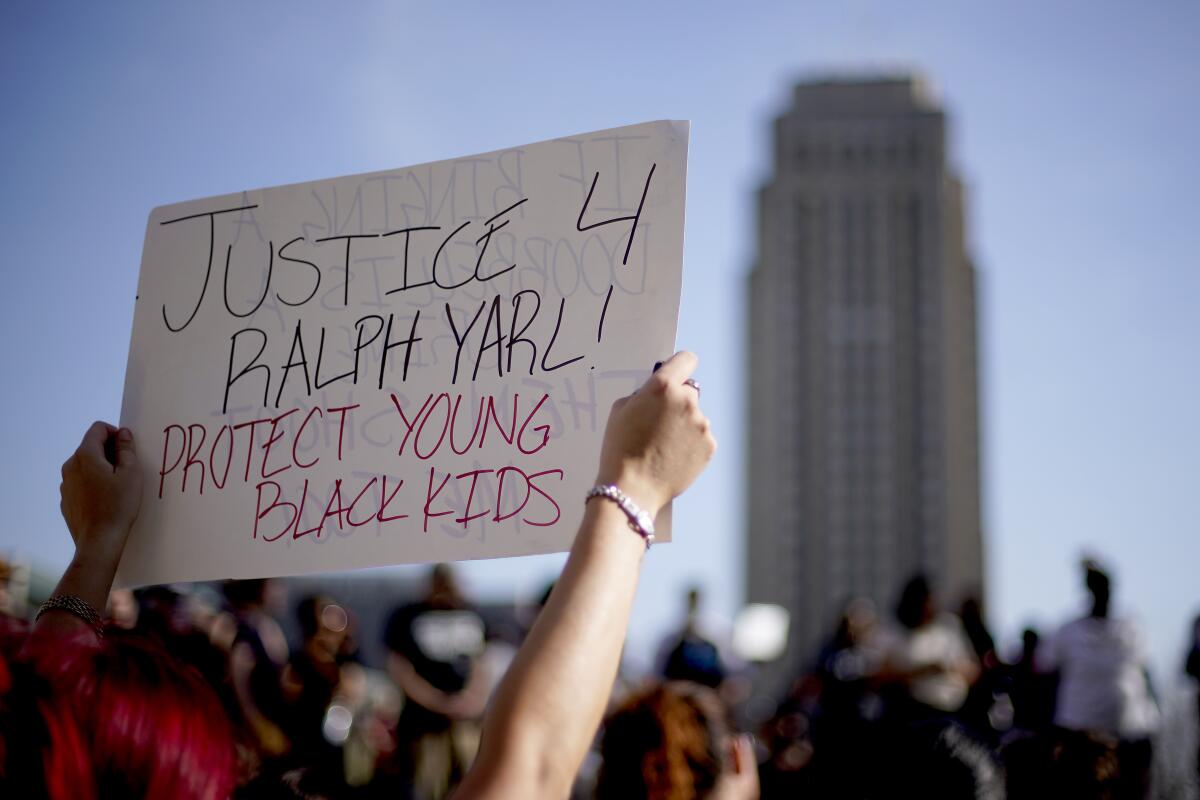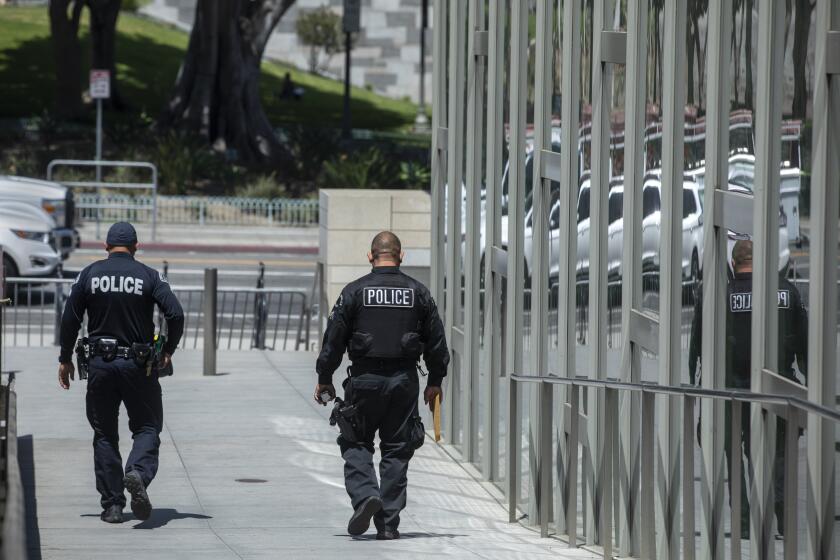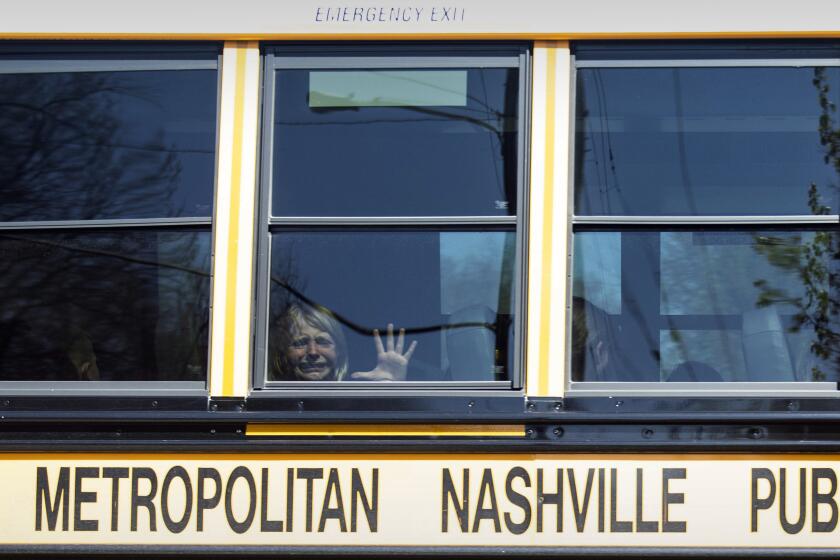How self-defense laws can allow violent racism to go unpunished

- Share via
Under standard self-defense doctrine, hair-trigger assumptions about Black boys and men that may have caused Andrew Lester to shoot 16-year-old Ralph Yarl for merely ringing his doorbell could shield Lester from criminal liability. That reflex, even if rooted in racism, might well be deemed reasonable in the eyes of the law.
This deeply disturbing legal reality highlights the limited capacity of our legal system to adequately address such incidents even if we repealed “stand your ground” laws for civilians and abolished qualified immunity for law enforcement. Even without those unjust laws, the general law of self-defense makes allowances for harboring negative racial stereotypes about Black people by excusing frightened civilians and police officers who act on them.
The larger challenge than recruiting officers is maintaining a culture of accountability that builds public trust.
As long as these widespread stereotypes persist, the law of self-defense will continue to let off police officers and ordinary citizens who use lethal force more hastily against Black people than similarly situated white people. That’s because self-defense doctrine permits lethal defensive force against persons who reasonably appear to pose an imminent threat of serious harm.
Lester has been charged with two felonies, first-degree assault and armed criminal action, and has pleaded not guilty. To escape conviction, he’ll need to convince a jury that he honestly and reasonably believed that he had to shoot Yarl to avoid being assaulted or suffering a home invasion — even if he was mistaken in his belief that he was under attack.
So how does the law determine whether a shooter’s beliefs and reactions were reasonable?
A 2022 Supreme Court decision is overturning one law after another that seeks to reduce gun violence in America.
“Reasonableness” in legal discourse is a term of art whose legal usage differs markedly from that of ordinary language. A “reasonable” attitude or belief in legal discourse is not necessarily rational or right. Instead, the reasonable person is the average, typical person, and reasonable beliefs are typical beliefs. The “reasonable person” is more appropriately described as the “ordinary person” (i.e., a person who possesses ordinary human weaknesses).
The laudable moral intuition behind this approach to criminal responsibility is that we should not blame and punish people for ordinary expressions of human frailty. In applying the reasonable person standard, jurors — themselves typical people holding typical beliefs — ordinarily judge the reasonableness of the defendant’s beliefs by projecting themselves into the shooter’s situation and asking whether they would have shared his beliefs under similar circumstances.
If the answer is yes, if the shooter arouses their sympathy, they will find his reactions reasonable and acquit.
A major problem arises, however, when anti-Black bias is so typical, ordinary and commonplace in American society. And because it is, actions taken that kill or maim Black people are, in that sense, “reasonable.”
Polls and studies repeatedly demonstrate that most Americans — consciously or unconsciously — hold negative stereotypes about Black people and crime. For instance, experiments conducted with police officers showed that officers were quicker to decide to shoot an unarmed Black target than a similarly situated unarmed white target. And a comprehensive survey of social science literature by the American Bar Assn.’s National Task Force on Stand Your Ground Law in 2015 found that “the stereotypical association of Black males with aggression and crime” cause fearful people to perceive Blacks as potential threats, “which can translate to diminished empathetic responses, greater hostility, and a tendency to respond violently towards Black targets.”
Trying to pinpoint the motives of shooters doesn’t protect us from future attacks the way common sense gun laws could.
Lester, for example, said Yarl was a “Black male approximately 6 feet tall.” Lester claimed “he was ‘scared to death’ due to the male’s size.” In fact, the teenager is 5 foot 8 and 140 pounds, according to his family. Research has shown that people often “adultify” Black children, that is, perceive young Black males as bigger and more physically threatening than young white males of the same size. When a police officer shot and killed 12-year-old Tamir Rice in 2014, while he was playing in a park, the president of the Cleveland Police Patrolmen’s Assn. described Rice as “a 12-year-old in an adult body.”
Such discriminatory reactions often occur in the cognitive unconscious. But whether conscious or not, the consequences for Black victims are similar. By excusing mistakes rooted in ordinary human frailty, the law of self-defense can be used to defend and forgive racist instincts.
So long as Black boys and men draw racism-based fear, self-defense claims in the shooting of unarmed Black people will continue to be raised. To minimize the harm these stereotypes cause in encounters between police officers and Black folk, we must minimize unnecessary contacts between these armed and anxious state actors and the Black community.
Do we need armed officers enforcing traffic laws, for instance, given how fraught these stops often are, how speculative their benefits, and how often minor traffic infractions are used as pretexts to profile Black and brown people? Reducing the footprint of law enforcement in the lives of African Americans reduces the opportunities for the ordinary human frailty of officers to result in unnecessary tragedies.
One big thing civilians can do to minimize the harms stereotypes cause in interactions with Black victims is get rid of the guns in their lives. Recognize that guns, in the context of ubiquitous unconscious and conscious racism, are a persistent and pervasive menace to Black lives, even in the hands of the well-intentioned. Get them out of your holsters and your homes. Make gun control a part of your anti-racism activism.
Jody Armour is a professor of law at USC and the author of “N*gga Theory: Race, Language, Unequal Justice, and the Law.”
More to Read
A cure for the common opinion
Get thought-provoking perspectives with our weekly newsletter.
You may occasionally receive promotional content from the Los Angeles Times.












